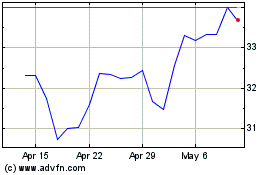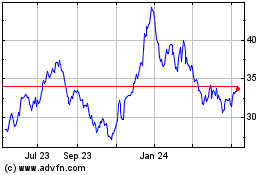2nd UPDATE: Justice Department, EU Clear Google Buy Of Motorola Mobility
February 13 2012 - 5:57PM
Dow Jones News
Google Inc.'s (GOOG) $12.5 billion acquisition of smartphone and
tablet developer Motorola Mobility Holdings Inc. (MMI) on Monday
received antitrust clearance from the U.S. Justice Department and
the European Union, but regulators said they will monitor how
Google and others use essential patents in the wireless
industry.
The Justice Department on Monday also cleared second tech-patent
deal that has raised antitrust concerns in the smartphone industry.
It will allow a consortium of tech companies including Apple Inc.
(AAPL), Microsoft Corp. (MSFT) and Research In Motion Ltd. (RIMM)
to acquire a trove of patents from bankrupt Canadian
telecom-equipment maker Nortel Networks Corp. for $4.5 billion.
In a third related announcement, the department cleared Apple's
acquisition of certain patents held by Novell Inc.
The department said in a statement the transactions "are not
likely to significantly change existing market dynamics."
Monday's regulatory milestones move Google nearer to closing an
acquisition that it says is very important to its mobile strategy.
"The combination of Google and Motorola Mobility will help
supercharge Android," Google said Monday, referring to its mobile
operating system that is used in many smartphones. The deal will
give Google a powerful arsenal of patents to use in the increasing
number of courtroom battles worldwide over the hotly-contested
smartphone market.
Google is still awaiting antitrust approval from other countries
where Motorola does business--namely China. The deal might not
close for several weeks, said people familiar with the matter.
The EU's antitrust clearance of the Google deal came with a
stern warning that companies should stop using certain types of
patents to sue each other. "We have approved this acquisition
because, upon careful examination, this transaction does not itself
raise competition issues," EU Competition Commissioner Joaquin
Almunia told reporters. "But we will not abandon monitoring of this
issue."
The EU and the Justice Department said they are paying special
attention to standards-essential patents, which are necessary to
make phones work with an industry standard, like 3G or WiFi.
Companies who hold these patents must license them to peers on a
fair, reasonable, and non-discriminatory basis--known as "Frand."
This means patents can't be used to stop rivals putting a product
on the market or companies charging extraordinarily high royalty
payments to prevent rivals using the technology.
"Today's decision does not mean the merger clearance blesses all
actions by Motorola in the past or all future action by Google with
regard to the use of standard essential patents," Almunia said,
noting that Motorola has some injunctions in Germany against Apple.
In a recent court judgment, Apple got the sale of one Samsung
tablet computer blocked in the country.
Earlier this month, the commission started a formal
investigation into whether South Korea's Samsung Electronics Co.
Ltd. (SSNHY, 005930.SE) is using standards-essential patents to sue
rivals including Apple--he said the case is "a priority" today.
Almunia said he had started the case against Samsung because the
company was using injunctions to try and block the sale of Apple's
products, without having first offered to license access to the
standards-essential patents on a Frand basis first--and that he is
ready to do the same against other companies.
Samsung has said it believes the commission will ultimately
conclude the company complies with the rules.
"We are aware of the increasingly strategic use of patents in
the sector and are vigilant," Almunia said.
Almunia said the commission is trying to establish "rules of the
game" for what it called a "patents war" between the various
technology companies.
Almunia said that while companies have written to various
standard-setting organizations, they have promised different levels
of commitment to protecting and licensing the patents, which is a
cause of concern for authorities.
Last week, Google sent letters to dozens of standards
organizations promising that it would offer licenses for Frand
patents in Motorola's portfolio, but in contrast to Apple and
Microsoft it didn't rule out seeking injunctions against any
potential violators.
The Justice Department said Monday that its concern about the
anticompetitive use of standard-essential patents "was lessened by
the clear commitments by Apple and Microsoft" on their licensing
policies. Google's commitments were "more ambiguous," the
department noted.
It said it would continue to monitor the use of
standard-essential patents in the wireless device industry and
"will not hesitate to take appropriate enforcement action" to stop
the anticompetitive use of patent rights.
-By Frances Robinson, Dow Jones Newswires; +32 2 741 1486;
frances.robinson@dowjones.com
--Amir Efrati and Ian Sherr contributed to this article.
Marcus and Millichap (NYSE:MMI)
Historical Stock Chart
From May 2024 to Jun 2024

Marcus and Millichap (NYSE:MMI)
Historical Stock Chart
From Jun 2023 to Jun 2024
